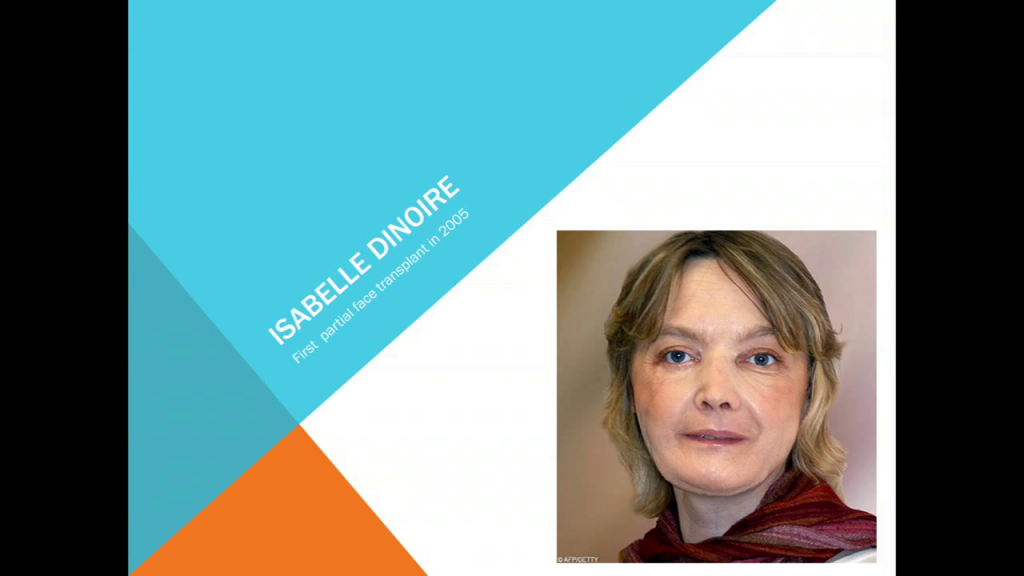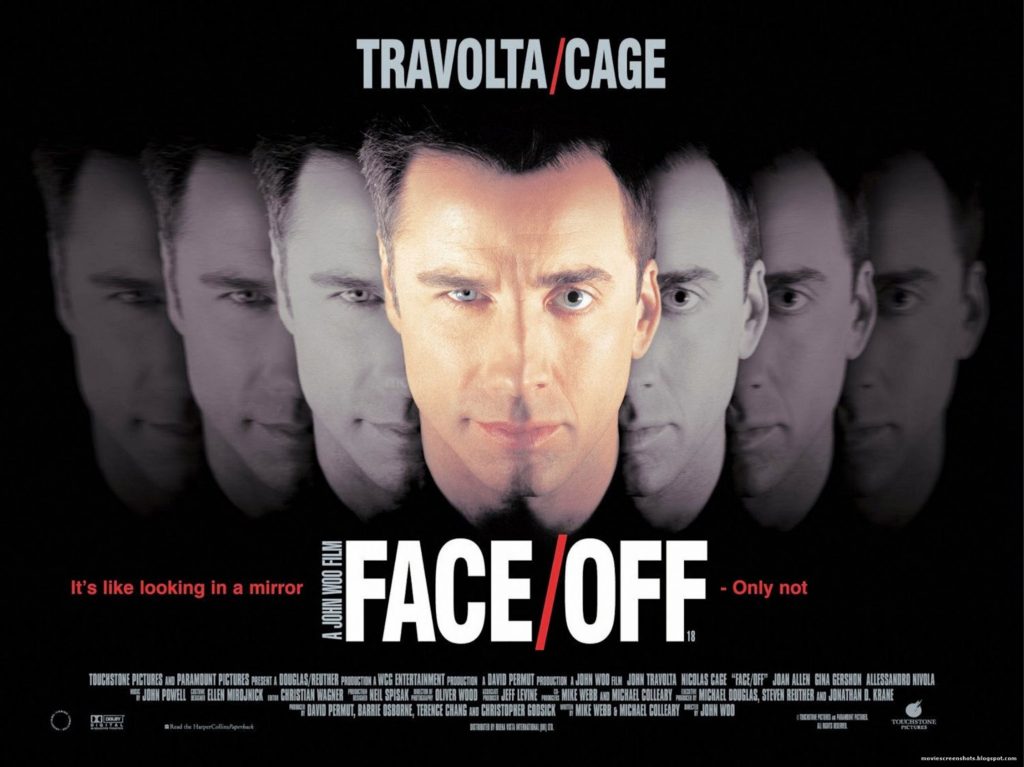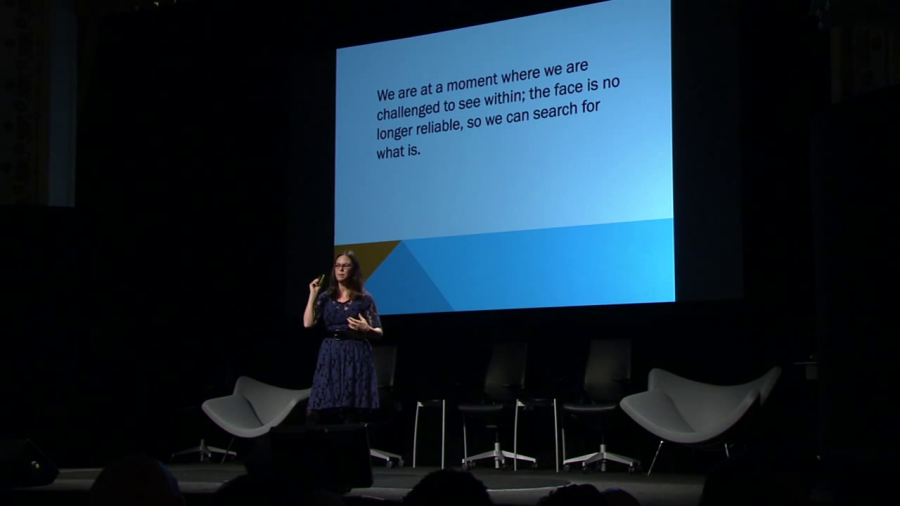Hi. I’m going to start by answering what seems to be the burning question at PopTech for me and let you all know at the outset that I’m not going to talk about Renée Zellweger today. And I’m sorry to disappoint you because I’m actually going to start by talking about…me. And I’m going to also start by talking about performance a little bit. Because of course I’m performing here today right now, and I thought about it really carefully. I thought about how I was going to appear to you really carefully.
The PopTech vibe is creative and casual. Dress comfortably and leave suits, ties and high heels at home. We suggest you pack comfortable shoes for walking around town and a jacket to keep you warm. A scarf and hat wouldn’t hurt either. Fall temperatures vary widely in Midcoast Maine, so be sure to check for the latest weather updates and pack accordingly.
PopTech FAQ [presentation slide]
And I thought about my costume. Choosing to disregard the PopTech dictum and invitation to appear totally comfortable. Some of you will recognize this as well. Because I knew this was being filmed, and because frankly I wanted to look good. Please let’s all agree to just tell me that I succeeded.
And the other thing I did, I put on my game face. That’s what we say, right? “Put on your game face.” Which seems to imply that we can change our faces. That we have, you know, this kind of face for this experience, and this kind of face for that experience, and that we can change our faces through expression, through make up, through context. It seems to say that we have different kinds of faces. Kind of. We have different kinds of faces, kind of.
Because the truth is that even without my game face, you’d probably recognize me, short of some kind of dramatic intervention. And I actually did think about putting up a whole array of pictures of myself in different contexts to test this. But I thought it might come across as a tad narcissistic. So I didn’t do that. But I did sort of think really carefully about the fact that our faces actually more or less stay the same, and that really matters. It matters a whole lot, because in many ways that’s the very basis on which our ethical obligations to one another are resting. It’s the very basis on which our social community and our interactions arise.
The French philosopher Immanuel Levinas has taught us that it is through our interactions with the face of somebody else, it is through encountering the face of another, that our responsibilities to someone else arise. You cannot look at somebody else, truly look at them, and then walk away without having some kind of sense of a relationship towards that person.
But what if the other has no face? What then? Or what if the face of the other is actually the face of another person entirely? And now some of you are thinking, “Okay, we’ve gone into the realm of science fiction. We’ve gone into the realm of zombies without faces. We’ve gone into the realm of crazy Frankensteinian monsters.” This kind of futuristic, crazy dystopian fiction.
But, there are people without faces. Maybe they’re the victims of acid attacks, or electrocution. Perhaps they’ve been shot at point blank range. Maybe they’ve been mauled by a dog, by a chimpanzee. And I’m not going to show you pictures of these things, partly because I think your imagination can do the work without it. Partly because I don’t know how strong your stomachs are and lunch is coming up. And partly because I really do want to respect the privacy of the individuals involved if, at all possible. Because I’m not talking about random examples. These are some of the back stories of the over thirty people to date who have received face transplant surgery. And again some of you are thinking, what is she talking about?

But some of you will remember back in 2005, the case of Isabelle Dinoire, who took a series of pills in an attempt at suicide and passed out. Her dog attempted to rouse her, and in so doing chewed off her nose, her lips, and her chin, also known as “the triangle.” Dinoire was rushed to the hospital immediately in Lyon, and her team greeted her, and over the course of six months in a series of extensive tests, she was deemed an appropriate candidate for the world’s first-ever face transplant surgery.
And then the world erupted. People went crazy over this surgery. The debates were fast and furious and mostly negative, asking all kinds of questions about the ethics of this operation, about Dinoire herself, about her doctors. And underlying it all was this overwhelming sense of fear. Do some of you remember this? Yeah, this overwhelming sense of fear and this idea of just because we could, does that mean we should? Which is maybe the opposite of the question of a rebel? I don’t know. Just because we could, does that mean we should?
So, why? Why this huge amount of debate? It’s kind of hard to recapture that moment now, in our contemporary experience. When we think, “You actually gave a woman back the ability to participate in the populace, to appear in public.” Why would we deny her that? Well, there are some reasons, and I’m going to go through them a little bit quickly.
Something that we might call clickbait today, right? The idea that this is a fantastical story. Why not jump on it, particularly in the crazy twist of fate that this attempted suicide actually received the face of a successful suicide?
Which raises a series of questions about whether Dinore herself has the psychological fortitude to look in the mirror every day and see the face of somebody else.
And what about her doctors? Did they just jump on this in order to win the face race? Maybe.
And then there’s the yuck factor, which I bet some of you are feeling right now. That kind of…[shudders]. And the “yuck factor” is, by the way, a technical term coined by Arthur Caplan who’s a bioethicist. It’s your physical visceral response to any new technology having to do with the body. So in that sense, the face transplant is really the paradigmatic yuck factor.
And some of it—and this is really important and I don’t want to dismiss it, even though in my rebellious mode I think a lot of these debates are in retrospect a little insane—the very serious bioethical issues involved of making a supposedly “well person” sick because any transplant patient has to take a lifetime of immunosuppressants that actually make you vulnerable to a host of illness.
And also, and related to that, is really this question of whether or not somebody who is getting this kind of intervention is cheating. And the cheating piece comes up a lot. It comes up a lot with any kind of body modification, because we are so vested in the idea that we can look at somebody and see their identity. And we also know that better-looking people get more stuff. So if you make yourself better-looking, if you make yourself look better, somehow you’re cheating in some kind of way.
And also you’re manipulating history, right? You can no longer look at somebody and assume that you know something about who they are and where they came from.
And yet, now, almost ten years later, a lot of that debate died down. And I’ll give you a couple of reasons why.
Data. Dinoire’s done okay. The psychological trauma of looking in the mirror and seeing somebody else, probably not as big a deal as not seeing anything at all.

And also, it’s changed from science fiction to science. No evil doctors. It’s not this. Although, the title of my next book is going to be Face/On. Pro tip, everybody. And it’s not this.

So, what is it? Well, it’s still scary. And here I’m just going to wrap up. And it’s still scary because it does vex that very one-to-one correlation between specific person and unique identity. It does raise the possibility that we can look at somebody and not trust them. It does tell us that one face can belong to multiple people.
And this is particularly acute because we’re getting that story from the other side as well. Because one person can simultaneously have multiple faces, multiple identities. Of course, we can all have as many avatars as we want, and they can all be dramatically different. And sure, that may not be new. I opened up by saying we all have many faces, we’ve all been performing all the time. We’ve known that forever, right? But all of these avatars can exist at the same time, and be dramatically different. And for a lot of people, we’re in crisis mode. Because we no longer have that sense of unique distilled identity.
And I’m here to say, rebelliously perhaps, this is not a crisis. It’s a real opportunity in our encounter with the other. It’s a real opportunity to look beyond the appearance. To look beyond a centralized body. This is a real opportunity for disability, for gender, for race, for ethnicity, to say, “I understand who you are not because of how you appear. And I am going to figure out a way to get at what that is, because how you appear? That is not the way.”
And maybe here I seem to be going against Levinas, who I opened up with, but actually this is really consonant with his ideas, because he told us, he taught us, the best way to see is to look at somebody and not even know the color of their eyes. A kind of vision that is really blind to the outside, but penetrating to the interior.
So I invite you to join me in reimagining what it means to be human. To look beyond the exterior wall, still recognizing the vital importance of identity, of humanity, and think about a new way to access what it means to be you.
Thank you.
Further Reference
This presentation at the PopTech site.
Sharrona Pearl’s faculty page at the University of Pennsylvania.
